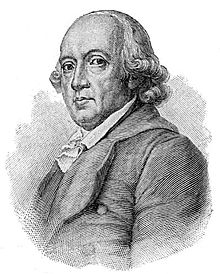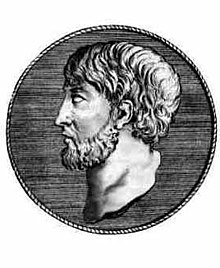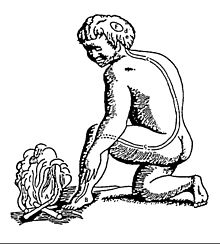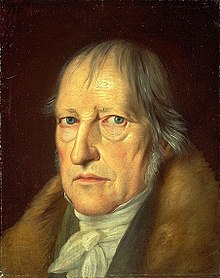Mind
![]()
The title of this article is ambiguous. For other meanings, see Ghost (disambiguation).
![]()
Mental is a redirect to this article. For the television series of the same name, see Mental (television series).
Spirit (Ancient Greek πνεῦμα pneuma, νοῦς nous and also ψυχή psyche, Latin spiritus, mens, animus or anima, Hebrew ruach and Arabic rūh, English mind, spirit, French esprit) is a term used inconsistently in philosophy, theology, psychology and everyday language.
In the context of consciousness, one can roughly distinguish between two meaning components of the term "mind":
- In relation to the cognitive abilities of humans, which are generally referred to as "mental", "mind" in the sense of "psyche" refers to perception and learning as well as remembering and imagining and fantasizing and all forms of thinking (of the "mind" or "reason") such as considering, selecting, deciding, intending and planning, strategies, foreseeing, estimating, weighting, evaluating, controlling, observing and monitoring, the necessary alertness and attentiveness as well as concentration of all degrees up to hypnotic and other trance-like states on the one hand and those of vigilance and highest presence of mind on the other hand.
- Connected with religious ideas of a soul up to expectations of the hereafter, "spirit" comprises the assumptions, often called spiritual, of a pure or absolute, transpersonal or even transcendent spirituality, which is not bound to the bodily body, which only has an effect on it, and which is thought to be created by God or to be equal to him or to have the same essence as him, if not even identical with him. Holy Spirit, on the other hand, is called in the Christian world of imagination the "Spirit of God", who is understood as the person of the divine Trinity.
The question of the "nature" of mind is thus a central theme of metaphysics.
In the tradition of German idealism, on the other hand, the term refers to supra-individual structures. Hegelian philosophy, for example, is to be understood in this sense, as is Wilhelm Dilthey's conception of the humanities.
![Illustration from Robert Fludd's Utriusque cosmi maioris scilicet et minoris [...] historia](https://alegsaonline.com/image/RobertFuddBewusstsein17Jh.png)
Illustration from Robert Fludd's Utriusque cosmi maioris scilicet et minoris [...] historia
The concept of the mind
The modern heterogeneous conceptions of spirit have their origins in ancient philosophy on the one hand and in the Bible on the other. While in most Romance languages a corresponding term developed from the Latin spiritus, the concept of spirit derives from the Indo-Germanic root *gheis- for to shudder, to be seized and excited. The West Germanic word *ghoizdo-z probably meant "supernatural being" and was reinterpreted in Christian terms with the Christianization of the Germanic peoples, so that the term served in Old High German (geist) and Old English (gást) writings as a translation for the biblical Spiritus Sanctus. This meaning of the word persisted until the present day, so that "ghost" is also used as a synonym for "spectre".
Another level of meaning, which is no longer obvious today, places "spirit" in a context with "breath, breath of wind" as an expression of vitality. Thus, in Luther's translation of the Bible, the phrase "heaven is made by the word of the Lord, and all his host by the spirit of his mouth" is still found. The Latin spiritus also has this meaning; it is related to spirare "to breathe".
Moreover, the term mind is used to refer to the cognitive and emotional existence of a living being. Controversial in theory is the relationship between mind and brain: While theology and philosophy in the tradition of René Descartes assume that the term "mind" refers to an immaterial thing, many natural scientists and philosophers postulate that the mind is nothing more than neuronal activity. In this case, the term ultimately refers to the brain. Other philosophers, on the other hand, claim that the mind is not an immaterial substance, but nevertheless cannot be reduced to the brain. The nature of mind is the main subject of the philosophy of mind.
In various theories, and occasionally in everyday life, the term is used to characterize supra-individual phenomena, objects, properties, or processes. Johann Gottfried Herder's work Vom Geist des Christentums (On the Spirit of Christianity) played a decisive role in shaping this use of the term. "Spirit" became a central concept in German-language culture at the latest with the work of Georg Wilhelm Friedrich Hegel. According to Hegel, an objective spirit manifests itself in communities, while the absolute spirit characterizes art, philosophy, and religion. The social sciences also use the concept of spirit to refer to characteristics of communities. Max Weber's talk of the "spirit" of capitalism, for example, is to be understood in this sense. This "spirit" results from the norms and values of capitalist communities. In common usage, for example, we find the phrase: "Here a spirit of concord prevails".

Johann Gottfried Herder
Mind in philosophy
Ancient
The answer to the question of what the German term "Geist" encompassed in antiquity is problematic with such a multi-layered word.
The aspects expressed by "spirit" in Greek antiquity are primarily encompassed by pneuma (spirit, breath) and nous (reason, mind). In addition there are the expressions psychê (soul), thymos (life (force), anger/courage) and logos (speech, reason).
Pneuma as well as nous denote partly a human faculty, but also a cosmological principle. According to the meaning of the word, pneuma is a materially conceived body of moving air. Nous, on the other hand, is sometimes thought of as immaterial. For the most part, it is thought of as absorbing in human affairs, and as initiating in cosmic affairs.
The human and cosmological realms (i.e., the question of world order) are mostly treated separately, although there are overlaps. Two aspects, among others, play a role in these transmissions:
- Regarding pneuma the thought that moving air, breath is a (necessary) component of life.
- Regarding pneuma and nous the transfer of properties of a living being to the cosmos:
(a) in the case of pneuma, in particular in so far as it is animate,
(b) with nous in particular in so far as it is rational.
Pneuma
Pneuma is first documented in the 6th century BC by Anaximenes. Here we find an analogy that identifies pneuma as the principle of life and also presents the cosmos itself as animate:
"Just as our soul, which is air, holds us together with its power, so also the whole cosmos embraces wind [or breath, pneuma] and air."
The concept of pneuma is also significant in medical language, where it was introduced by Diogenes of Apollonia in the 5th century BC and further developed by Erasistratos and Galenos in the 2nd century AD. From him comes an important distinction - also in the later Latin tradition - of three pneumatic principles, which arise from the interaction of inhaled air and the vital heat produced in the heart:
- a physical pneuma (spiritus naturalis) which maintains the vegetative functions;
- a living pneuma (spiritus vitalis), a principle of life and movement;
- a psychic pneuma (spiritus animalis), the soul.
Since Hellenism and especially in the Roman Stoa, the two aspects of human capacity and cosmological principle have been mixed in the concept of pneuma. Pneuma here denotes the material substance - the Stoics were materialists - of both the individual soul and the world soul. Pneuma is thus a material and at the same time spiritual principle that permeates the entire cosmos - imagined as a living being - and brings about its organization. At the beginning of life, the pneuma in man is like a blank page that is filled with sensual impressions and ideas. It is, moreover, the directing part of the soul that makes it possible to fulfil the demand, central to Stoics, to "live in accordance (with nature - conceived as reasonable)".
Nous
In Homer and later in most of the pre-Socratics, nous seems to be a faculty that is directed towards sensual as well as intelligible objects. Xenophanes and also Empedocles put thinking and perceiving into one. For Parmenides, however, nous has only necessarily existing and therefore only intelligible objects.
With regard to the functioning, it is attested by pre-Socratics such as Empedocles, Anaxagoras and Democritus that they regarded the mind, thinking, as a bodily process. Empedocles, who advocated the principle that like is known only by like, claims that the blood is the seat of cognition because it is the most thoroughly mixed substance.
Plato and Aristotle - in contrast to many pre-Socratics - understand the activity of nous, thinking, as a non-corporeal process. This only belongs to the human being. Moreover, Plato explicitly distinguishes the sensually perceptible from the intelligible and - in the tradition of Parmenides - very clearly argues that knowledge is only possible against sensual perception and the body.
Aristotle, in his writing De anima, defines nous as "that by which the soul thinks and makes assumptions." He compares nous - analogous to perception - to a blank writing tablet of wax. Nous is unaffiliated (i.e., unstimulated), indeterminate, a passive faculty whose nature is to be able to actualize what it thinks in taking in forms. Neither is it associated with any particular organ, but is incorporeal.
In Hellenism, the cognitive faculty nous is conceived materialistically by both the Stoa and Epicurus. Both schools attribute cognition entirely to materially conceived perception.
Cosmological principle
After some earlier thinkers had attributed corresponding properties to a cosmological principle, the Greek mathematician and natural philosopher Anaxagoras gives nous a leading role in the explanation of the world. For him, nous is a principle of motion that he contrasts with matter, although he does not explicitly describe it as non-material. Heraclitus assumes a similar function for the all-managing logos, which he describes as rational.
For Plato, the world has the characteristics of an animate being endowed with reason, and he explains its nature with recourse to a divine reason. Aristotle assumes an "unmoved mover" who moves the world dependent on him and the heavens as a final cause, i.e. like a beloved or aspired to. His uninterrupted activity consists in thinking the best object, himself (noêsis noêseôs). Aristotle understands this god - in contrast to the human faculty discussed above - as purely actual. In late antiquity, Plotinus assigns to nous the cosmological role of shaping the visible world as a demiurge according to the model of the world of ideas.
Medieval
In the transition between late antiquity and the early Middle Ages, the philosopher and Christian church teacher Augustine distinguished between the spirit (mens, animus) and the soul (anima). He understands the spirit as a substance that participates in reason and is intended to guide the body ("substantia quaedam rationis particeps regendo corpori accomodata"). Reason (ratio) and insight (intelligentia) are inherent in the spirit. It is weakened by vices (vitium) and must be purified by faith (fides) in order to be able to do justice to its task of leadership.
He describes the human spirit as the "eye of the soul (oculus animae)". To this the knowledge of eternal truths is possible through the unchanging light (lumen incommutabilis) of the divine spirit, which illuminates the human spirit and that which it encounters. This light represents the innermost being of man himself. The turning (conversio) of the human being towards this innermost is for Augustine the self-fulfillment of the spirit and means the return to its actual origin.
Thomas Aquinas, one of the main representatives of scholasticism, conceives of the human soul as a spiritual substance (substantia spiritualis). Unlike the animal soul, it has a purely spiritual character and is therefore immortal. Thomas advocates a strict body-soul unity of man. The soul is the form of the body (forma corporis) and communicates its being to it. Conversely, however, the spirit is also dependent on the body and its sensual mediation for cognition. All spiritual knowledge is abstracted from the sensory perceptions by means of the "active intellect (intellectus agens)".
Man as weakest ray of spirituality is not able to see the pure spiritual. Knowledge can only reach as far as the spiritual content of the sensible, from which it emanates, allows it. A direct knowledge of God is therefore impossible for Thomas.
The human soul is for Thomas the lowest of the spiritual forms. It is a rational principle that necessarily needs a body in order to be active. It therefore represents a lower level of spirituality than the soul of angels, which has no connection with matter. Although the soul does not depend on matter for its existence, it nevertheless projects deeply into the corporeal, since without the body it is something unfinished. It becomes with Thomas the outermost and most attenuated ray of the light of understanding, which shines forth in God and reaches its lowest limit in man as being does with matter. It stands, therefore, on the boundary of spiritual and corporeal creatures (in confinio spiritualium et corporalium creaturarum).
Descartes
For the philosopher, mathematician and scientist René Descartes, founder of rationalism, the mind is ontologically separate from matter; reality is divided into a material and a non-material sphere. Humans are essentially distinguished by their immaterial minds, and thus differ from animals, which Descartes conceives of as automata. In support of his mind-body dualism, Descartes developed arguments that are still debated in philosophy of mind today. For example, he stated that one can clearly imagine that mind exists without matter. But what can be clearly imagined is also possible, at least in principle. And if it is possible in principle for spirit to exist without matter, then spirit and matter cannot be identical. Variants of this argument can be found in today's debate in Saul Kripke and David Chalmers.
Another of Descartes' arguments relates to human linguistic ability: it is inconceivable that an automaton could master the complex system of a natural language. This argument is rejected by most philosophers and scientists today, with reference to the findings of computer, psycho- and neurolinguistics. It remains to be said, however, that human linguistic ability has by no means been comprehensively researched and that computational linguistics is far from being able to grasp the complexity of natural languages.
Descartes' image of man is thus essentially twofold: Man consists of a material body and an immaterial mind. Body and mind interact with each other at a point in the brain (the pineal gland). If a person burns his foot, for example, the stimulus is conducted through the body to the brain and from there to the mind (see illustration). In the mind, the person feels pain, which in turn causes a physical reaction. Representatives of such dualism have to explain, among other things, how exactly this interaction of mind and body is to be imagined. In contemporary philosophy, this problem is discussed under the term mental causation.
18th and 19th century
David Hume, who is often regarded as the most important philosopher of the Enlightenment in the Anglo-Saxon world, held the idealistic empiricist view that the mind is based solely on forms of immediate perception. Johann Wolfgang von Goethe defined spirit in roughly this sense in West-östlicher Divan:
"For life is love, and the spirit of
life."
Immanuel Kant drew on both Hume and Gottfried Wilhelm Leibniz. Within the framework of transcendental idealism, the human mind itself is involved in the formation of reality. A reality free of the mind and its subjectivity can only be imagined as a thing-in-itself. However, even with reference to the thing-in-itself, no concrete statements about a reality independent of the mind are possible, since the thing-in-itself cannot be grasped by human categories. With the idealist turn, there is a revaluation of the spirit, which becomes a constitutive element of reality.
In the philosophy of the 19th century, especially in German Idealism, this tendency continued. Hegel developed an absolute idealism that sought to overcome the subjective withdrawal of the claim to knowledge of objective truth. In it he conceived of the history of thought dialectically as a historical process of the development of the world spirit. This is conceived as the turning back of the Absolute from its otherness, nature, to itself. It is concretized in the three manifestations of spirit: in the subjective spirit of the individual human being, in the objective spirit of the human community forms of law, society, and state, and in the absolute spirit, art, religion, and philosophy. In philosophy the return of the spirit to itself is completed in the form of absolute knowledge. The absolute spirit is thus the epitome of reality and the ground of all being.
In German idealism, the Kantian program was continued without its idea of the thing-in-itself. This moved the spirit even further into the focus of philosophical attention, since a reality independent of the spirit was now not even assumed as a boundary concept. The mind-body problem found the following solution within the framework of such conceptions: if the mind is always already constitutive of the scientifically investigated nature, then it makes no sense to ask whether and where the mind is to be located in this nature. In the present philosophy of mind, consistently idealistic theories are only rarely advocated.
In contrast, Karl Marx, referring to Hegel, formulated his materialist conception of the spirit. According to this, the "mode of production of material life" or the work anchored in it conditions the "social, political and spiritual life process".
Particularly through Charles Darwin's development of the theory of evolution, man was increasingly also regarded as a biological system. This led many natural scientists to regard the mind as a product of purely biological processes. In Germany, the so-called vulgar materialists around Ludwig Büchner and Carl Vogt caused a sensation with such claims and thus triggered the materialism controversy. The evolutionary biologist Ernst Haeckel also postulated that the mind was a scientifically detectable phenomenon. Haeckel's monism, however, is not to be understood as materialism, since Haeckel, in the tradition of Baruch Spinoza, assumed a neutral substance with spiritual and material aspects. However, there were also incomparably more sceptical voices among the natural scientists of the 19th century. The electrophysiologist Emil Heinrich du Bois-Reymond, for instance, declared in an influential lecture in 1872:
"What conceivable connection is there between certain movements of certain atoms in my brain, on the one hand, and, on the other, the facts which are original to me, which cannot be further defined, which cannot be denied away, 'I feel pain, I feel pleasure; I taste sweetness, I smell rose-scent, I hear organ-sound, I see Roth ...'"
The concept of the spirit was given a further component of meaning in the 19th century by the philosopher, psychologist and educator Wilhelm Dilthey, co-founder of the philosophy of life, who contrasted the humanities with the natural sciences. In his view, the humanities are distinguished by a special method, hermeneutics. While the natural sciences are concerned with causal relationships, the humanities are intended to contribute to a deeper understanding of phenomena. The New Kantian Wilhelm Windelband tried to make this distinction more precise by emphasizing that the humanities investigate particular and unique events, while the natural sciences search for general laws of nature.
20th century
In the early 20th century, philosophical thinking about the mind was significantly influenced by the Vienna Circle. The members of the Vienna Circle sought to draw philosophical consequences from the methodology of psychological (methodological) behaviorism. The classical behaviorists had declared that introspective claims about the mind could not be verified and therefore could not be part of a science. Psychology, they argued, must therefore confine itself to descriptions of behavior. In the Vienna Circle, these assumptions were combined with verificationism, that is, the thesis that only testable statements have meaning. As a consequence, statements about the mind appear to be meaningless unless they are about behavior.
The behaviorist tradition found its continuation in Gilbert Ryle's 1949 work The Concept of Mind, which became the orthodox interpretation of the subject of "mind" in Anglo-Saxon philosophy for more than a decade. Ryle declared that it was a category mistake to assume that mind is something internal. In contrast, the work of Ludwig Wittgenstein was in some tension with behaviorism. While Wittgenstein also denied that the mind was to be understood as an internal state, he at the same time distinguished himself from behaviorism.
The phenomenology founded by Edmund Husserl led in an opposite direction, explicitly aiming at the investigation of subjective, mental phenomena. In the procedure of epoché, all assumptions about the external world are to be "bracketed", thus making possible an exploration of pure subjectivity. Referring to Franz Brentano, Husserl assumed that mental states were essentially characterized by intentionality. By this is meant that mental states relate to something, for example, longing for a person relates to a person. Husserl's phenomenology exerted an enormous influence on 20th century philosophy, including Husserl's student Martin Heidegger and Jean-Paul Sartre, who came to Freiburg to study with Husserl. In French philosophy, Maurice Merleau-Ponty in particular took up Husserl's concept of intentionality. Merleau-Ponty wanted to use the concept of the body to abolish the opposition between body and mind. The body is a living and actively perceiving body and can thus not be grasped through an opposition of the spiritual and the non-spiritual.
The early 1960s also saw a radical departure from behaviorist theories in Anglo-Saxon philosophy. Inspired by the successes of neuroscientific research, identity theorists sought to reduce the mind to the brain. An analogous program was advocated by functionalists, but based on artificial intelligence and cognitive science. These reductive efforts did not go unchallenged, however; seemingly insurmountable problems with reductionism were pointed out. With the so-called qualia (consciousness of phenomena) and intentionality, the mind, according to many philosophers, has properties that cannot be explained by natural sciences.
Due to the tension between the successes of empirical research and the problems of reductionism, a very differentiated debate about the nature of mind has arisen in philosophy. Today, various forms of physicalism, dualism, and pluralism are advocated. The Eliminative Materialists dispense entirely with the assumption of the existence of a mind.

The term pneuma is first attested in Anaximenes.

Illustration by Descartes: An irritation on the foot is conducted via the nerves to the brain, where it interacts with the mind and thus produces an experience of pain.

Georg Wilhelm Friedrich Hegel, portrait by Jakob Schlesinger, 1831
Questions and Answers
Q: What is the mind?
A: The mind is a general term for the way a person thinks, reasons, perceives, wills, has ideas, and feels.
Q: What does science say about the mind?
A: Science believes that what others call the mind is entirely caused by workings of the brain.
Q: What did Gilbert Ryle say about the mind?
A: Gilbert Ryle called mind the "Ghost in the Machine". He said the idea that it was separate from the brain was the mistaken "Official Doctrine".
Q: What do some people believe about the mind and body?
A: Some people believe that mind is separate from the body and is called a soul (see dualism).
Q: What do some people argue makes up the mind?
A: Some people argue that our rational and emotional states cannot be separated and should all be part of what we call the mind.
Q: Is the mind private?
A: Yes, one of the important things of the mind is that it is private. No one else can "know our mind."
Q: What is the meaning of mind in the sense of talking to ourselves "inside our heads"?
A: People often use mind to mean the same as thought: the way we talk to ourselves "inside our heads". This is where the sayings "make up our minds," "change our minds" and "of two minds" come from.
Search within the encyclopedia